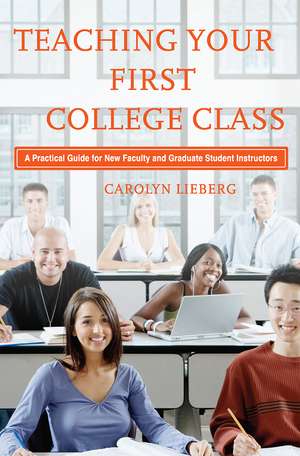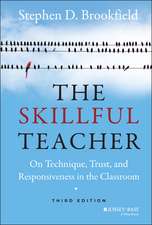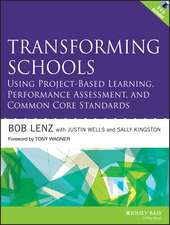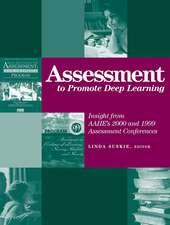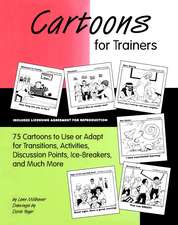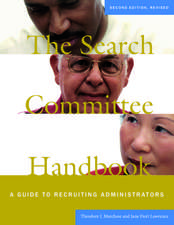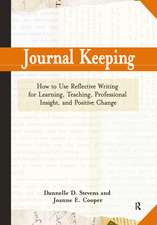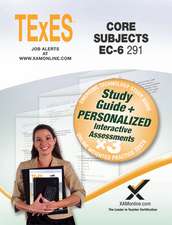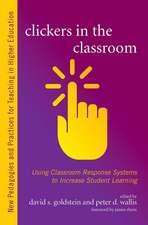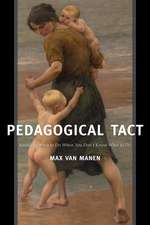Teaching Your First College Class: A Practical Guide for New Faculty and Graduate Student Instructors
Autor Carolyn Liebergen Limba Engleză Paperback – 20 mai 2008
Preț: 226.86 lei
Nou
Puncte Express: 340
Preț estimativ în valută:
43.41€ • 45.44$ • 36.13£
43.41€ • 45.44$ • 36.13£
Carte tipărită la comandă
Livrare economică 31 martie-14 aprilie
Preluare comenzi: 021 569.72.76
Specificații
ISBN-13: 9781579222260
ISBN-10: 1579222269
Pagini: 216
Dimensiuni: 152 x 229 x 15 mm
Greutate: 0.34 kg
Ediția:1
Editura: Taylor & Francis
Colecția Routledge
Locul publicării:Oxford, United Kingdom
ISBN-10: 1579222269
Pagini: 216
Dimensiuni: 152 x 229 x 15 mm
Greutate: 0.34 kg
Ediția:1
Editura: Taylor & Francis
Colecția Routledge
Locul publicării:Oxford, United Kingdom
Public țintă
Postgraduate and Professional Practice & DevelopmentCuprins
1. BEGINNINGS. On Being a Novice College Teacher; The Bold Enterprise; Apprehensions and Trepidations; The “It” Factor—Help Students Understand What It Means to Be Educated; Types of Appointments; Finding Help for Your Teaching 2. TEACHING INTENTIONALLY. Success—Three Brief Tips; Pedagogy; Teacher-Centered to Student-Centered; Teachers in Their Many Roles; Critical Thinking; Some Major Figures in Pedagogy; Special Attention to Undergraduates; Making Use of Technology 3. THE FIRST DAY. A Tone that Signals Community; Authority in the Classroom; Facilities and Their Modifications; Your First Class—Instruction or Only Orientation; Dealing with Anxiety; Day One Arrives; Employing Active Learning from the Start; Messages to Students…Subtle and Bold; Diversity, Diversity, Diversity; Introducing Students to Your Discipline; The Great Start—Yours 4. CREATING A SYLLABUS. Syllabus or Course Guidelines—Which Works for You?; Your Course’s “Clock”; Constructing a Syllabus 5. PAUSING TO ASSESS AND REFRESH. Finding Out What Your Students Know—and Helping Them Change Their Minds; Classroom Assessments 6. STUDENTS—WHAT THEY EXPECT & WHAT YOU MIGHT EXPECT. Student Constituents—Gender, Race, Ethnicity, Religion, Class, Age, Students with Disabilities, Athletes, and Celebrities; Grade Inflation; The Notion of Students as Customers; Your Students’ Unasked Questions; Preparing Your Students for Learning—Mnemonics and Beyond; Mandatory Conferences; Learning Styles 7. PREPARATION FOR DISCUSSIONS. One Hundred Percent Participation; Creating Guidelines with Students; A Safe Environment; Learning Names—Everyone’s Task; Who Speaks and Who Doesn’t, and Who Talks Too Much; Difficult or ChallengingTopics. Taboos, Personal Values, and Hurt or Angry Feelings; Humor; Laughing at Others—Be Prepared; Preparing Content; Session Goals; Using PowerPoint 8. FACILITATING DISCUSSIONS. Texts, Problems, Evidence; Relying on Homework; What You Should Know About How Well Students Read; Using the Board; Video Clips and Films; Using Computer Displays and Overheads; Some Formats to Jump-Start Discussions; Time-Outs for Sluggish Sessions; Discussions Gone Wild; Dealing with Un(der)Prepared Classes 9. PLANNING ASSIGNMENTS. Your Opportunities for Creating Assignments; The Mechanics of Planning; Papers, Real or Cyber; Exercise vs. Display; Motivation; Repetition; Carrots and Sticks—Getting Students to Do Their Homework 10. WHEN STUDENTS WRITE—CONSIDERATIONS AND ASSIGNMENT IDEAS. Writing—The Emotional Side; Assignment Ideas; Term Papers and Their Alternatives 11. GROUP WORK AND PRESENTATIONS. Using Groups in Your Classes; Gender and Race in Small Groups; Long-Term Projects; Optimizing Group Activities; Pitfalls Group Projects; Helping Students Give Successful Presentations 12. FRAUD, CHEATING, PLAGIARISM, AND SOME ASSIGNMENTS THAT DISCOURAGE IT. Fraud in Higher Education; Cheating; Plagiarism and Assignments that Discourage It; Dealing with Students Who Cheat or Plagiarize 13. GRADING. Institutional Requirements; Two Mandates of Grading; Learning Outcomes; Rubrics; Test Construction; Improvement as a Factor; Non-native English Speakers and Others with Writing Problems; Weighting Grades; Gate-Keeping Knowledge; Extra Credit; Grading Attendance; Keeping Track of Participation; Assessing of Public Speaking; Grading Group Presentations; Efficient Grading; Making Use of Technology; Grade Complaints; Student Evaluations of You 14. MAKING THE MOST OF YOUR TEACHING TIME AND PLANNING FOR YOUR FUTURE. Teaching Portfolios; Papers and Poster Sessions, Awards, and More; Translating Teaching Experiences into a Career Other Than Teaching; Resume or Curriculum Vitae; Index.
Notă biografică
Carolyn Lieberg was Associate Director of the Center for Teaching at the University of Iowa for eight years. Previously she worked at the Carnegie Foundation for the Advancement of Teaching. She now lives in Washington, D.C.
Recenzii
"Carolyn Lieberg has written a smart and sensitive guide for graduate students and new faculty preparing to teach their first college class. An advocate for student-centered approaches to teaching, Lieberg leads newcomers through a rich repertoire of strategies to transform a classroom of individuals into a community of learners. Beautifully written, this is a how-to book with heart. When teachers and students are seen as whole people, the routines of active learning come alive, engaging students with content, with each other, and with skills of conversation and collaboration that will serve them well throughout life."
Mary Taylor Huber, Senior Scholar
The Carnegie Foundation for the Advancement of Teaching
"Teaching Your First College Class contains a great deal of ‘I-wish-I-had-known’ wisdom for new and old instructors in higher education. The book is written clearly, with a minimum of jargon, and lays out in an accessible form the best practices for the college teacher. It should be assigned as part of any doctoral program.”
David D. Perlmutter, Professor and Associate Dean for Graduate Studies & Research
School of Journalism & Mass Communications, University of Kansas
“Faculty members and graduate students teaching their first college class need mentors. Those fortunate enough to include Carolyn Lieberg, through her book, Teaching Your First College Class, among their mentors will be off to a good start. Her wisdom is offered with warmth and intelligence, and her concern for students’ learning shines through on every page."
Tom Rocklin, Vice Provost and Dean of University College
The University of Iowa
“Carolyn Lieberg runs the gamut of teaching topics and situations that first-year instructors will encounter—providing personal insights, useful strategies, and principles of good practice in college teaching—to help new instructors embrace the joys and challenges of college teaching. Both teaching assistants and those who supervise or train teaching assistants will find this an ideal resource they’ll refer to again and again. I highly recommend it as an essential textbook for a course on college teaching.”
Laurie Bellows, Director of Graduate Student Development and of the McNair Scholars Program
University of Nebraska-Lincoln
"If college teaching for the first time was easy, Lieberg (education, U. of Iowa) would have a lot less to say, but she is fully aware (a wisdom based on experience) that college teaching is not simple, whether as a novice, grad student instructor, or even as a long-tenured veteran. She gives very practical advice on motivating yourself and your students, teaching intentionally, getting ready for the first days and weeks, creating a syllabus, assessing and refreshing, expecting what students expect, preparing and facilitating discussions, planning and initiating assignments, working in groups and making presentations, making assignments that discourage fraud, grading, making the most of your time and thinking about the future. "
Book News Inc.
"Teaching a college cass is different from any other teaching situation. Teaching Your First College Class: A Practical Guide for New Faculty and Graduate Student Instructors is a guide for fresh professors on how to effectively teach in a college classroom. With proven strategies that work to maintain control and deliver the best educational experience possible Teaching Your First College Class tackles all of the essentials: time management, grading, setting rules with the students, discipline, and more. A great pick for any college educator who is just getting started, and highly recommended for college library education collections."
Midwest Book Review - The Education Shelf
"Since most graduate programs don’t focus their curriculum on what it means to become a worthy teacher in their respective fields, Teaching Your First College Class will prove an indispensable tool to anyone embarking on the task, both graduate instructors and newly-appointed assistant professors. Lieberg dispenses some graceful wisdom on the art of teaching without being overly prescriptive or reducing classroom strategies to easy formulas. This book is dedicated to helping novice teachers cultivate their most authentic voice and creative spirit in the midst of planning for the first day of the first course of the first semester. Whether you are new to the classroom or a veteran who is mentoring first-time teachers, you will find that this book provides a sensible blend of pedagogical history (the origins of 'student-centered classrooms'), practical advice, and pointed anecdotes aimed at helping new teachers spend less time being fearful and more time becoming successful."
Nancy K. Barry, Assistant to the Dean for Advising and Academic Support
Luther College
"In addition to practical tips, the book offers a very basic introduction to the scholarship of teaching... Readers who want a practical resource without the distractions of first-person narrative will find exactly what they are looking for in this books. It will be particularly useful for those who are unfamiliar with the scholarship of teaching and interested in a comprehensive, practical guide to the mechanics and details of their craft."
Teaching Theology & Religion
Mary Taylor Huber, Senior Scholar
The Carnegie Foundation for the Advancement of Teaching
"Teaching Your First College Class contains a great deal of ‘I-wish-I-had-known’ wisdom for new and old instructors in higher education. The book is written clearly, with a minimum of jargon, and lays out in an accessible form the best practices for the college teacher. It should be assigned as part of any doctoral program.”
David D. Perlmutter, Professor and Associate Dean for Graduate Studies & Research
School of Journalism & Mass Communications, University of Kansas
“Faculty members and graduate students teaching their first college class need mentors. Those fortunate enough to include Carolyn Lieberg, through her book, Teaching Your First College Class, among their mentors will be off to a good start. Her wisdom is offered with warmth and intelligence, and her concern for students’ learning shines through on every page."
Tom Rocklin, Vice Provost and Dean of University College
The University of Iowa
“Carolyn Lieberg runs the gamut of teaching topics and situations that first-year instructors will encounter—providing personal insights, useful strategies, and principles of good practice in college teaching—to help new instructors embrace the joys and challenges of college teaching. Both teaching assistants and those who supervise or train teaching assistants will find this an ideal resource they’ll refer to again and again. I highly recommend it as an essential textbook for a course on college teaching.”
Laurie Bellows, Director of Graduate Student Development and of the McNair Scholars Program
University of Nebraska-Lincoln
"If college teaching for the first time was easy, Lieberg (education, U. of Iowa) would have a lot less to say, but she is fully aware (a wisdom based on experience) that college teaching is not simple, whether as a novice, grad student instructor, or even as a long-tenured veteran. She gives very practical advice on motivating yourself and your students, teaching intentionally, getting ready for the first days and weeks, creating a syllabus, assessing and refreshing, expecting what students expect, preparing and facilitating discussions, planning and initiating assignments, working in groups and making presentations, making assignments that discourage fraud, grading, making the most of your time and thinking about the future. "
Book News Inc.
"Teaching a college cass is different from any other teaching situation. Teaching Your First College Class: A Practical Guide for New Faculty and Graduate Student Instructors is a guide for fresh professors on how to effectively teach in a college classroom. With proven strategies that work to maintain control and deliver the best educational experience possible Teaching Your First College Class tackles all of the essentials: time management, grading, setting rules with the students, discipline, and more. A great pick for any college educator who is just getting started, and highly recommended for college library education collections."
Midwest Book Review - The Education Shelf
"Since most graduate programs don’t focus their curriculum on what it means to become a worthy teacher in their respective fields, Teaching Your First College Class will prove an indispensable tool to anyone embarking on the task, both graduate instructors and newly-appointed assistant professors. Lieberg dispenses some graceful wisdom on the art of teaching without being overly prescriptive or reducing classroom strategies to easy formulas. This book is dedicated to helping novice teachers cultivate their most authentic voice and creative spirit in the midst of planning for the first day of the first course of the first semester. Whether you are new to the classroom or a veteran who is mentoring first-time teachers, you will find that this book provides a sensible blend of pedagogical history (the origins of 'student-centered classrooms'), practical advice, and pointed anecdotes aimed at helping new teachers spend less time being fearful and more time becoming successful."
Nancy K. Barry, Assistant to the Dean for Advising and Academic Support
Luther College
"In addition to practical tips, the book offers a very basic introduction to the scholarship of teaching... Readers who want a practical resource without the distractions of first-person narrative will find exactly what they are looking for in this books. It will be particularly useful for those who are unfamiliar with the scholarship of teaching and interested in a comprehensive, practical guide to the mechanics and details of their craft."
Teaching Theology & Religion
Descriere
This book is a wise and friendly guide for new faculty and graduate student instructors who are about to teach for the first time. It provides an introduction to the theory of teaching; describes proven strategies and activities for engaging students in their learning; and offers advice on classroom management.
